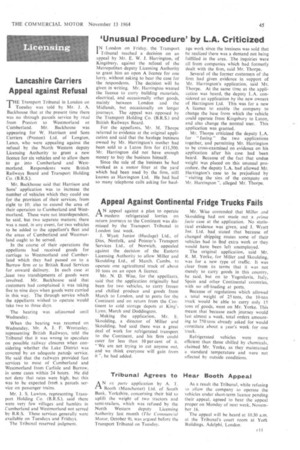Appeal Against Continental Fridge Trucks Fails
Page 47

If you've noticed an error in this article please click here to report it so we can fix it.
AN appeal against a plan to operate modern refrigerated lorries on return journeys to the Continent was dismissed by the Transport Tribunal in London last week. J. Wyatt Junior (Haulage) Ltd., of Diss, Norfolk, and Pointer's Transport Services Ltd., of Norwich, appealed against the deeision of the Eastern Licensing Authority to allow Miller and Skoulding Ltd., of March, Cambs, to operare one agricultural truck of about 10 tons on an open A licence. Mr. N. D. Wise, for the appellants, said that the application originally had been for two vehicles, to carry frozen and chilled produce and goods from March to London. and to ports for the Continent and on return from the Continent to cold storage depots at King-, Lynn, March and Doddington. Making the application. Mr. E. Skoulding, a director of Miller and Skoulding, had said there was a great deal of work for refrigerated transport to the Continent, and his firm could cater for less than 10 per cent of it. "We are not trying to cut anyone out. and we think everyone will gain from it ", he had added. Mr. Wise contended that Miller and Skoulding had not made out a prima facie case at the application. No statistical evidence was given, and J. Wyatt Jnr. Ltd. had stated that because of changed shipping routes some of their vehicles had to find extra work or they would have been left unemployed. The original application, said Mr. R. M. Yorke, for Miller and Skoulding, was for a new type of traffic. It was clear from its terms that it was not merely to carry goods in this country, he said, hut on to Yugoslavia, Italy, Spain and other Continental countries, with no off-loading at ports. Because of regulations which allowed a total weight of 25 tons, the 10-ton truck would be able to carry only 15 tons of goods. went on Mr. Yorke. This meant that because each journey would last almost a week, total orders amounting to 750 tons already asked for would constitute about a year's work for one truck. Refrigerated vehicles were more efficient than those chilled by chemicals, claimed Mr. Yorke, as they maintained a standard temperature and were not affected by outside conditions.
























































































































